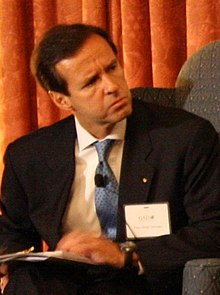Jorge Fernando Quiroga
| Jorge Quiroga | |
|---|---|
 |
|
| 76th President of Bolivia | |
|
In office 7 August 2001 – 6 August 2002 |
|
| Vice President | Vacant |
| Preceded by | Hugo Banzer |
| Succeeded by | Gonzalo Sanchez de Lozada |
| Vice President of Bolivia | |
|
In office 6 August 1997 – 7 August 2001 |
|
| President | Hugo Banzer Suarez |
| Preceded by | Víctor Hugo Cárdenas |
| Succeeded by | Carlos Mesa |
| Personal details | |
| Born |
May 5, 1960 Cochabamba, Bolivia |
| Political party |
ADN (before 2005) PODEMOS (2002-05) PDC (2005-present) |
| Spouse(s) | Virginia Gillum de Quiroga |
| Children | Vanessa Cristina Adriana Cristian |
| Alma mater |
Texas A&M University St. Edward's University |
| Profession | Industrial engineer |
| Religion | Roman Catholicism |
Jorge Fernando "Tuto" Quiroga Ramírez (born May 5, 1960) was President of Bolivia from August 7, 2001 to August 6, 2002. Quiroga was a candidate in the 2014 presidential election for the Christian Democratic Party.
Quiroga was born in Cochabamba. He graduated from Texas A&M University in 1981 with a degree in industrial engineering, becoming the first head of state from that university. He went on to work for IBM in Austin, Texas while earning a master's degree in business administration from St. Edward's University. He and his American wife Virginia then moved back to Bolivia. He has 4 children: Vanessa Elena, Cristina Andrea, Adriana Patricia and Jorge Cristian.
Quiroga was elected as Vice President of Bolivia in 1997 running on the Nationalist Democratic Action ticket with former dictator Hugo Banzer. At 37, he was the youngest vice president in Bolivia's history.
He became President when Banzer resigned because of aggravated health problems (he died a year following his resignation). Quiroga assumed office as acting president on July 1, 2001 and was sworn-in on August 7, to complete Banzer's five-year mandate.
Soon after becoming President he told a reporter from the New Yorker "We [Bolivia] will be the vital heart of South America.." believing that gas exports would lift the economy, that a long-anticipated transcontinental highway connecting Brazil to Chile would be built passing through the Bolivian city of Cochabamba, and that fibre-optic cables would soon be laid. He blamed Bolivia’s lack of economic progress on hypocrisy on free trade in the United States and Europe, saying "Bolivia is the most open economy in Latin America. Meanwhile, American and European farm subsidies, along with tariffs on textiles and agricultural products, make it impossible for Bolivia to sell its exports in the Global North. They tell us to be competitive while tying our arms behind our backs." When asked about the Bolivian Water Wars of 2000, he said “A lot of things certainly could have been different along the way, from a lot of different actors. The net effect is that we have a city today with no resolution to the water problem. In the end it will be necessary to bring in private investment to develop the water."
...
Wikipedia
